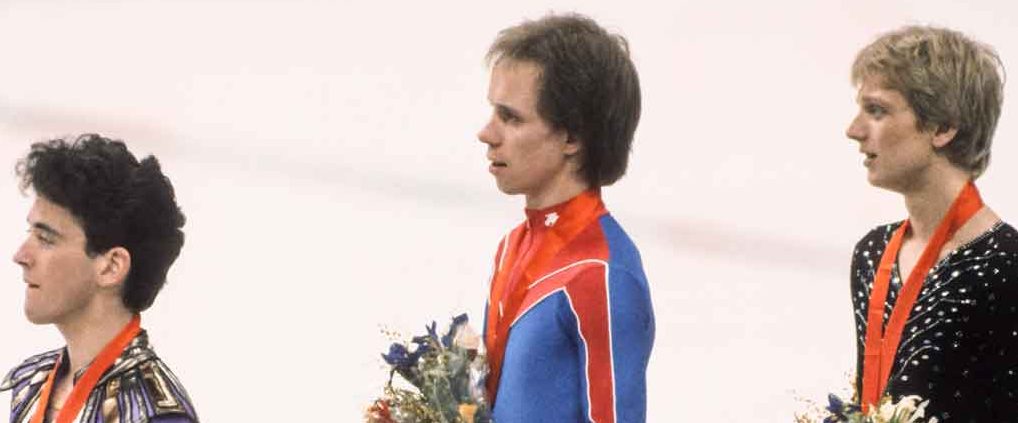Scott Hamilton’s Skating Career Started on Thin Ice

Scott Hamilton was a natural talent. What he lacked as a young skater was emotional maturity to compete seriously. “I was a phenomenal underachiever,” he jokes
From Scott Hamilton’s first tentative steps onto the ice to Olympic gold took 16 years of hard work. Those years were marked by big achievements, and equally big slip-ups. Hamilton learned early on that the world of competitive skating wasn’t always as smooth as the ice on which he glided.
To execute the dramatic jumps, spins, and backflips that would become his trademarks, he had to spend years working with coaches, honing basic skills. Painstakingly, day-by-day, he learned how to skate forward, backward, and in a figure-eight pattern. He practiced jumping up and down, forward and backward, over and over again. And he learned how to get up gracefully when he fell.
YOU MIGHT ALSO LIKE: Scott Hamilton Beats the Odds and Keeps Winning
At just eight years old, Hamilton landed his first competition, skating in the Bowling Green Invitational held in his Ohio hometown. He performed a minute-and-a-half routine choreographed to the music “Italian Street Song” in front of a panel of judges. “I remember my heart beating out of my chest as I was standing there at center ice, waiting for my music to start, and the judges were staring at me,” he recalled in his 2008 memoir, “The Great Eight.”
With shaking legs and a pounding heart, Hamilton carefully executed the moves he’d practiced with his coach. First a few bunny hops, skipping forward with one leg outstretched. Then he picked up speed, launching into three waltz jumps — a half rotation off one foot, landing backwards on the other. When the crowd erupted in applause, Hamilton knew he was on his way. “I was no longer a sick, pathetic little kid,” he wrote. “I was an entertainer.”
A phenomenal underachiever
Hamilton had undeniable natural talent. What he lacked was the emotional maturity to compete seriously. “When I was going into my second year on the junior level, I had come in last in novice men’s nationals, next to last in novice men, and third to last in junior nationals. I was a phenomenal underachiever,” he joked in a recent interview with YourCareEverywhere.
His parents, who had supported and encouraged him all the way, told him they were just about finished. They gave him one more year to make it as a competitive skater. Hamilton took the challenge to heart. “I just really worked hard that year and things started to happen,” he says.
YOU MIGHT ALSO LIKE: Scott Hamilton’s Rough Start
The money runs out
Under the tutelage of several different coaches — including husband-and-wife figure skating champions, Pierre and Andrée Brunet — Hamilton grew more confident on the ice. He began to win regional and sectional competitions. In 1976, he took home the junior national championship medal.
Only one thing stopped Hamilton’s skating career from progressing to the next level. He was broke. Competitive skating is an expensive undertaking. Skaters have to cover the costs of coaches and travel expenses, costumes and choreographers. In the mid-1960s, a skater could expect to shell out about $12,000 a year to compete at the national amateur level — about a third of what Hamilton’s father earned in an entire year.
His parents had sacrificed everything to get him to this point. They sold their home and cut back on day-to-day expenses. “They grew their own vegetables and fruits and canned them. And, when they’d buy meat, they’d buy a side of beef and freeze it in the garage,” he remembers. “They were trying to trim money wherever they could. My mom didn’t really buy any clothes for five, six years.” His family was running out of money — and patience.
Sponsors step in
Fortunately for Hamilton, a pair of wealthy benefactors stepped in just in time to save his fledgling career. His coach, Carlo Fassi, introduced him to Illinois philanthropists Helen and Frank McLoraine. The couple had already sponsored several promising skaters. In 1977, they agreed to take on Hamilton. The couple “became like parents to me. They were amazing and taught me so much and stuck with me through thick and thin,” he says.
To his parents, the financial reprieve was nothing short of a miracle. To Hamilton, it was the turning point in his career. “I call it ‘the trifecta.’ he says. “I turned 18 years old, I was sponsored, and I got my own apartment.”
At least, it should have been a turning point. His professional maturity still developing, Hamilton landed in a disappointing ninth place at the U.S. Figure Skating Championships. “I was so bad that year, and it was humiliating because I was given this golden ticket,” he says.
What made his defeat even more devastating was that it was the last competition in which his mother would ever see him skate. She died from breast cancer in 1977.
WANT TO FOLLOW SCOTT'S JOURNEY? Continue with Scott Hamilton's Miracle
Updated:
May 24, 2017
Reviewed By:
Christopher Nystuen, MD, MBA